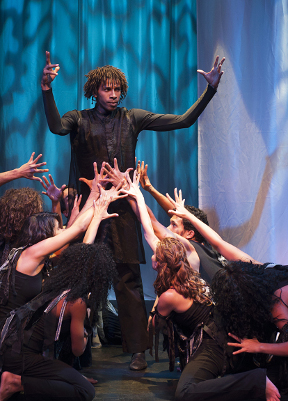
Glenda Frank
| Love and Superheroes
Lovers offer each other the moon, the stars and eternal love. Adolescents believe these vows and obsessive sometimes follow through. But most of us outgrow romantic ideals, some with regret, some with relief. Centuries ago, the eccentric Greek playwright Euripides wrote about a wife, Alcestis, who makes the ultimate sacrifice for her sniveling, self-pitying mate. Euripides was keen on flavoring his feminism with a touch of the demonic (witness “Medea”) and his more sentimental side with parody and sometimes even broad comedy. Seth Panitch has transformed this less known classic into a powerful love story set to a rock-infused score. The impressive choreography is by Osnel Delgado, whose sinewy performance on stage stands out even among this group of talented performers. The musical opens in a dark cave on the outskirts of Eternity where the Three Fates (Vitica Sobrino, Abby Jones, Diana Hernandez) are severing the life line of King Admetus. Apollo (Frank Egusquiza), a close friend, begs them for mercy. Dramatized through dance and a bi-lingual dialogue, where some characters speak Spanish, some English, the scene builds in erotic intensity as the goddesses become so aroused by Apollo’s passion and beauty, they allow a compromise. In the next scene we meet Alcestis (Alianne Portuondo), the title character, with her pet stallions (the dancers). She and the magnificent cavorting horses bring a poetic sensuality, until her husband’s arrival frightens all by one (the stylish Laura Treto) to flee. Three jostling retainers, who somehow recognize neither the queen nor king (Jeff Horger), provide comic outrage then dismay. The royal couple add their own domestic passion to the mix. The light moods are dashed when Apollo conveys the bad news: Admetus must die unless he can provide a willing substitute. This integration of dance, comedy, pathos, poignancy, and passion make for an engaging 88 minutes of theatre. And the mysterious ending is as thought-provoking as it is tantalizing. But first satire: Admetus goes to his people who declare their fidelity, gratitude, affection -- but not their lives. They vanish at his request. He throws a party for his political cronies, the nobles, who too swear devotion and have a solution. In a nice twist, we and Admetus are dismayed to learn they are not volunteering but have commandeered a servant. Only the scene between Admetus and his lamenting parents is disappointing. Admetus’ father (Joan Rodriguez) explains that he gave Admetus the gift of birth and reared him, but does not owe him his life. Old as he is, he values the living air and the light of the sun. It is an argument that resonates especially today when more college graduates than ever refuse to sever their financial dependence. But in Panitch’s adaptation it is more a rant, especially for English-speaking audience since the father’s long speech is in Spanish. The mother’s (Claudia Molinet) affirmation of love and dismay is more emotionally accessible. The couple exit holding each other in sorrow at the loss of their only son. Not until mid-play do audiences understand the title. Alcestis tells her husband that she prefers to die rather than survive alone. Admetus is astonished. He counted her a weak woman, her love a mirror of his. There is no question in this script that her sacrifice is a strength -- not one feminists esteem, but one that makes her equal in action to men willing to risk everything for their country or their honor. Enter another hero, the semi-god Hercules, soiled and stinking from cleaning the Augean stables, one of his seven labors. In the original he is loud, drunk and demanding women. Panitch softens this broad (satyr) comedy -- Which is a shame! Red-costumes dancing girls advise him of Alcestis death. Mortified to have been so insensitive, he resolves to descend to Hades and rescue her. In Hades (in another dance number), Alcestis again proves a warrior, resisting Hades as he demands she discards her memories. Panitch’s most effective innovations begin at this point. In Euripides, Admetus is a narcissist, whining that he must die, then that he must live wifeless. Panitch has him accompany the hero but flee in terror as Hercules battles Cerebus (three dancers), the three- headed dog guarding the gates of Hades. Back in the palace, Hercules offers Admetus a surprise, Celestia, veiled and wearing black. Admetus refuses her, but Celestia is persuasive. Then she reveals herself as Alcestis, her love stronger than death. It is very moving as they comfort each other. Euripides, far more cynical, left her identity open. She might as easily be a new wife. Panitch’s softened and poeticized version makes a mighty fine
rock musical, blending comedy and tragedy with a light hand. Equally
accomplished are the acting/dance performances on a minimalist stage
that evokes both palace and Hades through lighting by Mike Morin.
The choreography alone is a good reason to see the show. Osnel Delgado
has a fondness for trios, and his direction is sensitive to the moment,
highly focused, and dynamic. Delgado’s entrance as Death into
Admetus’ room is almost as haunting as Nosferatu’s. Kudos
all around.
|
| museums | NYTW mail | recordings | coupons | publications | classified |

